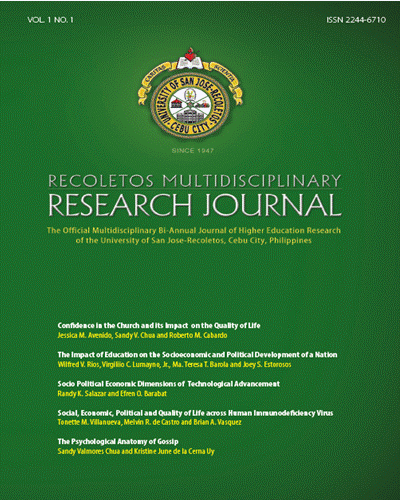Confidence in the Church and its Impact on the Quality of Life
DOI:
https://doi.org/10.32871/rmrj1301.01.01Keywords:
Religion, Quality of Life, Life SatisfactionAbstract
The study examines the effects of the confidence level in the church, along with other factors, on the quality of life of the citizens of a country. These factors include confidence in the Church, contraception prevalence, corruption index, life satisfaction, population, and gross domestic product. Quality of life is an individual’s perception of his/her position in life in the context of the culture and value systems in which he/she lives and in relation to his/her goals. This lends credence also to the Quality of Life Theory (Frisch, 2005). The results of the study show that countries with higher income have a higher level of confidence in the Church and higher life satisfaction. The results also manifest that countries with high population also have higher contraception prevalence but the lowest corruption index. These results only tell that religion has relatively positive effects on the quality of life of a country’s citizens.
References
Alexander, Doug.(n.d.).Data Mining.
Ellison, C.G. and J. S. Levin. (1998). The Religion-Health Connection: Evidence, Theory, and Future Direction: Bethesda MD, USA. National Center for Biotechnology Information.
Emmons, R.(2005).Striving for the Sacred Personal Goals, Life Meaning and Religion.Vol. 61 No. 4. Pp.56
Frey, B. S. &Stutzer, A. (2002).Happines Economics: How the Economy and Institutions affect human wellbeing. New York, USA: Princeton University Press.
Frisch, M.B.(2006).Life Satisfaction Therapy: Applying Life Satisfaction Approach to Positive Psychology and Cognitive Therapy
Greene, K.V.and Yoon Joon, B.(2003).Religiosity, Economics and Life Satisfaction.
NationMaster. (2004). “Life Satisfaction by Country†World Database of Happiness in Nations
McLeod, S. A. (2008). Cognitive Dissonance Theory - Simply Psychology.
Michalos, A.C.(2008) “The good life: eighth century to fourth century BCEâ€, in K.C.
Land (ed.), Handbook of Social Indicators and Quality-of-Life Studies, Springer, New York.
Population Census 2000 Handbook.(2007). New York, USA:United Nations Statistics.
Downloads
Published
How to Cite
Issue
Section
License
Copyright of the Journal belongs to the University of San Jose-Recoletos


